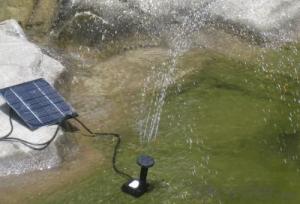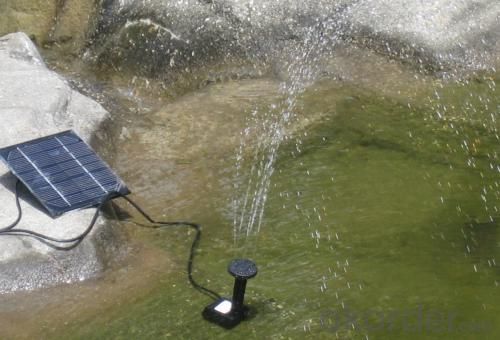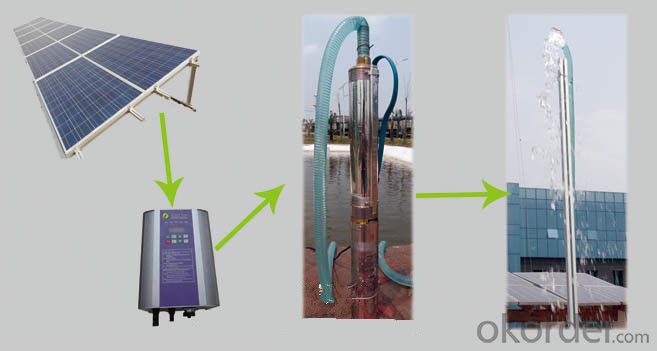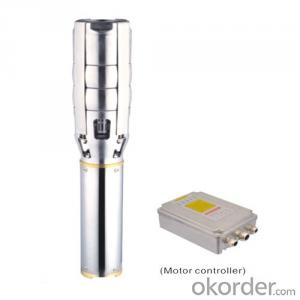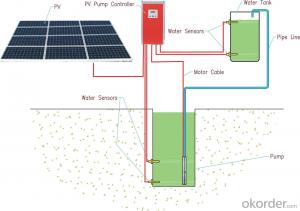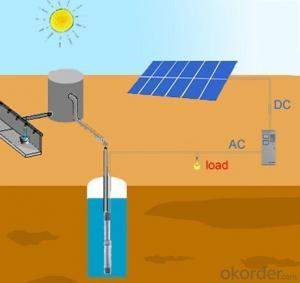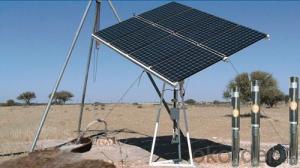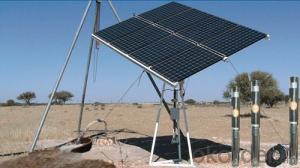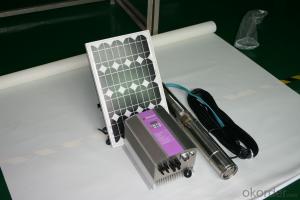Solar Pump Manufacturer's Solar Bore Pumps Solar Water Pump Price List
- Loading Port:
- Shanghai
- Payment Terms:
- TT OR LC
- Min Order Qty:
- 1 set
- Supply Capability:
- 1000 set/month
OKorder Service Pledge
OKorder Financial Service
You Might Also Like
Solar Bore Pumps Solar Water Pump Price List
DC solar water pumping system consists of the motor, pump, controller, solar array and some other accessories, such as water level sensor, float switch, etc. Considered that storing water is more efficient than storing electricity, the system is designed to directly drive the pump without battery which can reduce the construction and operating cost and routine maintenance effectively.The PV array consists of multiple solar panels connected in series/parallel, which can supply the whole system as power source by converting the absorbed solar radiation energy to the electrical energy. The pump driven by a brushless DC permanent magnet motor draws water from deep-well or river. The pumped water is then fed into reservoir or water tank, or connected to the irrigation system or fountain system directly.
Advanced Technology
Applications Innovation
The efficiency of DC brushless permanent magnet motor has been increased up to 25% in comparison with traditional asynchronous motor.
Technology Innovation
Stator and rotor are sealed by environment friendly casting resin.Motor insulation resistance can be hold higher than 300MΩfor more than 10 years, which consumedly increased the security and reliability of the submersible motor.
Structure Innovation
Casting resign technology processed stator and rotor as well as the water lubricated bearing make the submersible pump environment friendly.
Feature
High Efficiency & High Reliability
DC Brushless Permanent Magnet Motor
Minimum Maintenance, long Service Life
Environment Friendly Materials, Lubricated Without Oil
Application
Village or Family Water Supply
Animal Drinking Water & Livestock Watering
Garden/Courtyard Irrigation
Swimming Pool
Water Supply for Bivouac or Camping Car
Water Supply for Remote Area
Automatic Control
Operate Automatically, No Need Watching
Maximum Power Point Tracking (MPPT)
Dry-run Protection
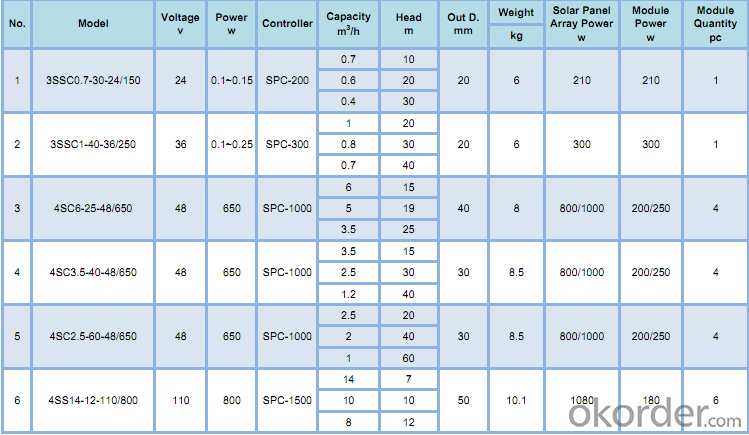
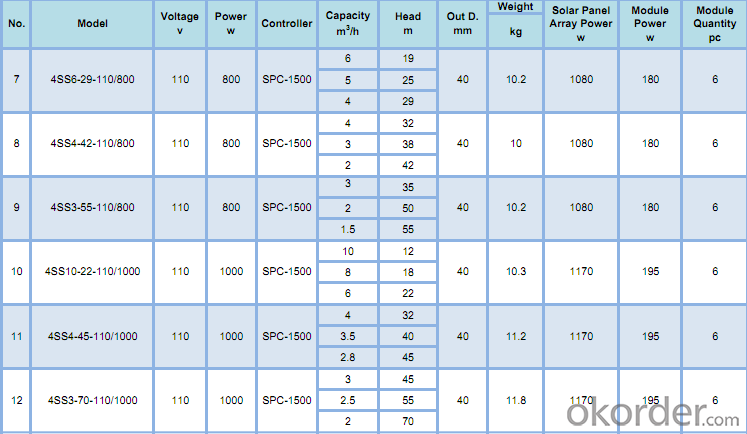
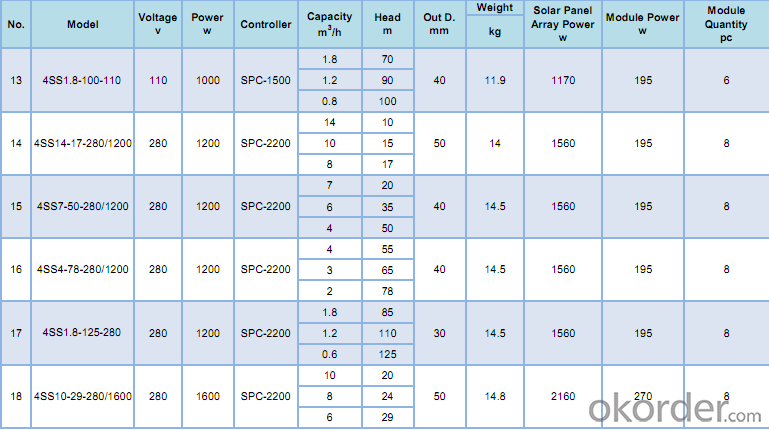
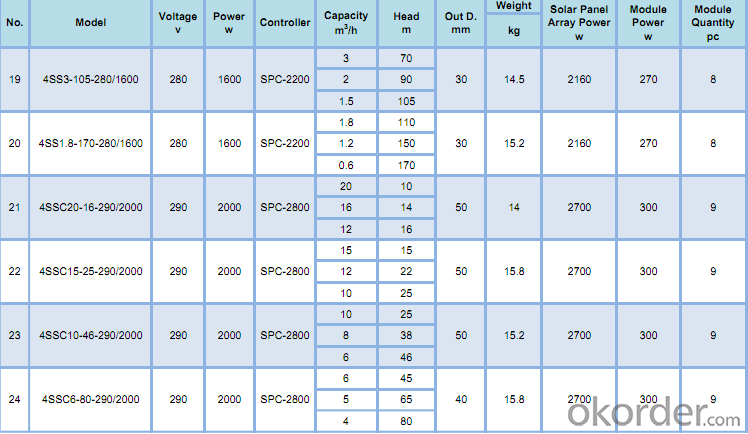
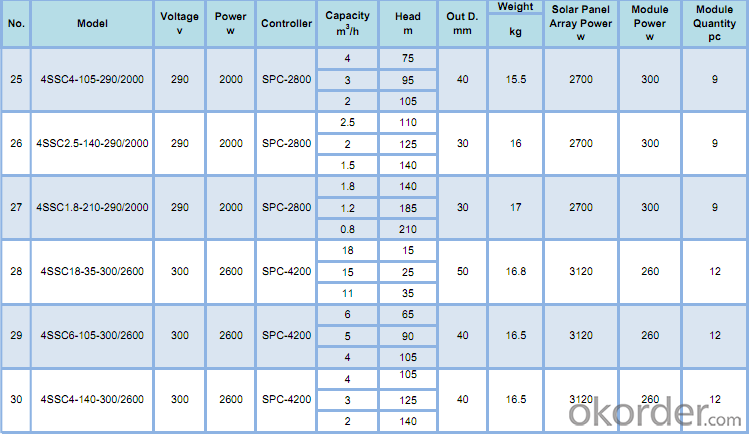
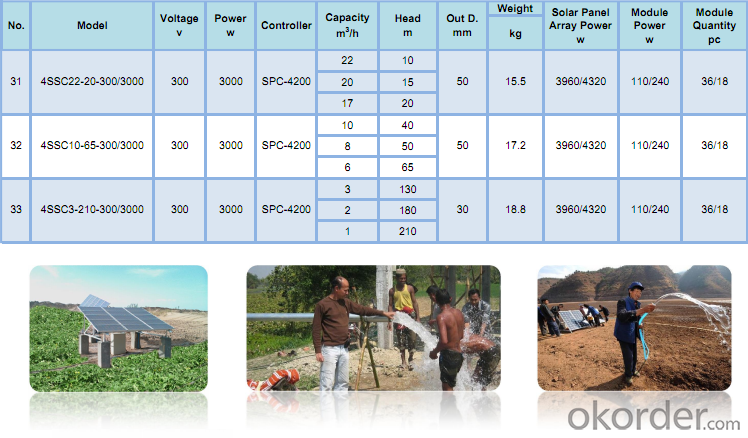
- Q: How deep can a solar pump draw water from?
- The depth to which a solar pump can draw water depends on various factors such as the power of the pump, the size of the solar panel, and the water table level. On average, a solar pump can draw water from depths ranging between 20 to 200 feet, but it is best to consult the specific specifications of the pump to determine its maximum suction capacity.
- Q: How does the solar self-priming pump be installed?
- The connection pipe of the inlet pipe must be tightened tightly, the seal must be tight, absolutely can not leak, try to use a soft flange gasket (such as fluorine rubber), otherwise it will seriously affect the pump self-priming performance
- Q: Are solar pumps suitable for high water volume requirements?
- Yes, solar pumps can be suitable for high water volume requirements. While traditional pumps may require a significant amount of electricity to operate, solar pumps are powered by the sun and can generate high amounts of power to meet high water volume demands. Additionally, advancements in solar pump technology have led to the development of more efficient and powerful pumps, capable of delivering large quantities of water. Solar pumps can be designed with larger pumping capacities and can be customized to meet specific water volume requirements. Furthermore, solar pumps can be integrated with storage systems, such as batteries, to provide a constant water supply even during cloudy or low-sunlight periods. Overall, solar pumps are a viable and sustainable solution for high water volume requirements, offering a reliable and environmentally friendly alternative to traditional pumps.
- Q: How does the size of the solar pump controller affect its performance?
- The size of a solar pump controller can have a significant impact on its performance. The size refers to the capacity or power output of the controller, which is usually measured in watts. A larger solar pump controller with a higher power output can handle larger loads and can therefore support more powerful pumps. This means that a larger controller can handle higher flow rates and lift heights, allowing for more efficient water pumping. It can also support larger solar panels, which can generate more electricity and recharge the batteries faster. On the other hand, a smaller solar pump controller with a lower power output may not be able to handle high flow rates or lift heights. It may struggle to power larger pumps, leading to reduced performance and efficiency. Additionally, a smaller controller may have limited compatibility with solar panels, resulting in slower battery charging and reduced overall performance. Therefore, choosing the right size solar pump controller is crucial to ensure optimal performance. It is important to consider the required flow rate, lift height, and the power requirements of the pump. By selecting a controller with a suitable size, one can maximize the efficiency and effectiveness of the solar pumping system.
- Q: Can a solar pump be used for water supply in food processing or beverage industries?
- Yes, a solar pump can be used for water supply in food processing or beverage industries. Solar pumps are a sustainable and cost-effective solution that can provide a reliable water supply for various industrial applications, including food processing and beverage production. These pumps can efficiently deliver water for cleaning, sanitization, and other essential processes, reducing reliance on traditional electricity and promoting environmental sustainability in the industry.
- Q: Can a solar pump be used for water supply in zoos and wildlife sanctuaries?
- Yes, a solar pump can be used for water supply in zoos and wildlife sanctuaries. Solar pumps are a sustainable and eco-friendly option that can efficiently extract and distribute water, ensuring a reliable water supply for the animals in these habitats. Additionally, solar pumps can reduce operating costs and dependence on traditional energy sources, making them a practical choice for water supply in such environments.
- Q: Can a solar pump be used for solar water heating systems?
- Solar pumps are not suitable for solar water heating systems. Despite both using solar energy as a power source, they have distinct purposes. Solar pumps are designed exclusively for extracting water from wells or other water sources by utilizing solar energy. They are commonly employed for irrigation, water supply in remote areas, or circulating water in swimming pools. On the contrary, solar water heating systems utilize solar energy to warm water for domestic or commercial use. These systems typically include solar collectors that absorb sunlight and transfer the heat to water. The heated water is then stored in a tank for later use. Unlike solar pumps, these systems do not require a pump for water circulation since heat transfer occurs naturally through convection. Consequently, although both solar pumps and solar water heating systems rely on solar energy, their functions are distinct, and they cannot be used interchangeably.
- Q: Can a solar pump be used for water supply in remote areas?
- Yes, a solar pump can definitely be used for water supply in remote areas. Solar pumps are a great solution for areas that lack access to grid electricity or where grid power is unreliable. These pumps are powered by solar energy, which makes them highly cost-effective and environmentally friendly. Solar pumps work by converting sunlight into electricity through photovoltaic (PV) panels. This electricity is then used to power the pump, which draws water from a source such as a well, river, or reservoir. The water can then be stored in tanks or distributed directly to the intended areas for various purposes like drinking, irrigation, or livestock. The use of solar pumps in remote areas has numerous advantages. Firstly, they reduce the dependence on traditional fuel-powered pumps, thus eliminating the need for fuel transportation and reducing carbon emissions. Secondly, solar pumps do not require extensive maintenance and are generally more reliable than fuel-powered pumps. They also have a longer lifespan, resulting in lower operational costs and increased efficiency. Furthermore, solar pumps can be easily installed in remote areas without the need for complex infrastructure. This makes them an ideal solution for regions where conventional electricity supply is not available or not feasible. Additionally, solar pumps can be designed to operate even in low-light conditions, ensuring a continuous water supply despite varying weather conditions. In conclusion, solar pumps are a viable and efficient option for water supply in remote areas. They provide a sustainable and reliable source of water while reducing operational costs and environmental impact. The use of solar pumps in these areas can greatly improve access to clean water and contribute to the overall development and well-being of the communities.
- Q: Can a solar pump be used for water supply in remote holiday resorts?
- Yes, a solar pump can be used for water supply in remote holiday resorts. Solar pumps are an efficient and sustainable option for remote locations where access to electricity may be limited. They rely on solar energy to power the pump, allowing for a constant and reliable water supply, even in remote areas. Additionally, solar pumps are environmentally friendly, as they do not contribute to carbon emissions. Overall, utilizing a solar pump for water supply in remote holiday resorts is a suitable and beneficial solution.
- Q: Can solar pumps work at night or on cloudy days?
- No, solar pumps are dependent on sunlight to generate electricity, so they are not operational during the night or on cloudy days when sunlight is limited.
Send your message to us
Solar Pump Manufacturer's Solar Bore Pumps Solar Water Pump Price List
- Loading Port:
- Shanghai
- Payment Terms:
- TT OR LC
- Min Order Qty:
- 1 set
- Supply Capability:
- 1000 set/month
OKorder Service Pledge
OKorder Financial Service
Similar products
Hot products
Hot Searches
Related keywords
